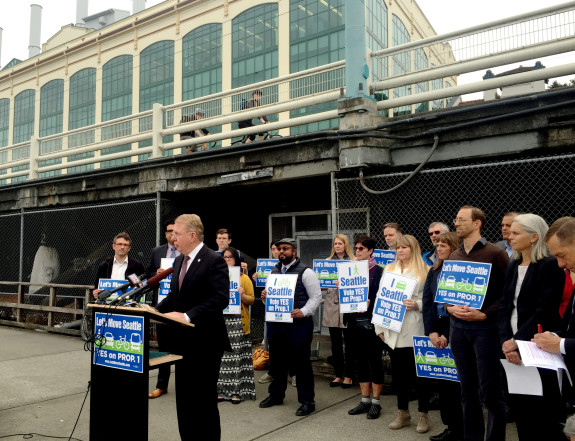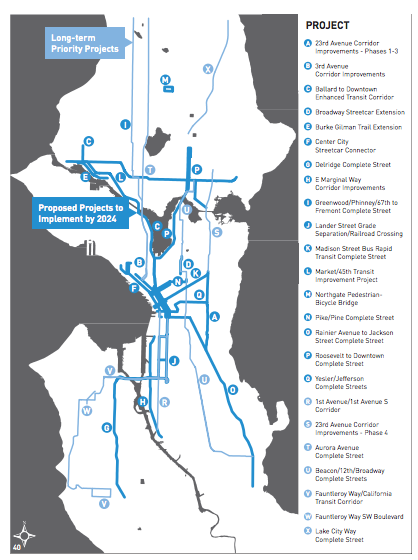
There were several local ballot measures with big implications for streets and transportation yesterday, and results were all over the map. Here's how three of the most notable votes turned out.
Seattle's property tax increase to fund walking, biking, and transit

Voters have spoken and they decided to enact Move Seattle, the $900 million property tax levy for transportation.
The funding will support Mayor Ed Murray's 10-year transportation vision [PDF], which lays out an agenda to reduce traffic deaths and greenhouse gas emissions, and generally make it safer and more convenient to walk, bike, or ride the bus.
Among the projects that will receive funding: seven rapid bus routes with dedicated lanes, a creative plan to fill gaps in the sidewalk network, and a network of 50 miles of protected bike lanes.
One of the longer-term goals of the plan is to put 75 percent of Seattle households within a 10-minute walk of frequent bus routes, running at least every 15 minutes.
The constitutional mandate to subsidize highways in Texas
In Texas, voters overwhelming passed Prop 7, a sales tax measure that will generate revenue for free highways. The measure mandates spending $2.5 billion in sales tax revenue annually on highways without tolls. As expected, Prop 7 won in a landslide, with about 83 percent of voters supporting the measure, according to the Austin Statesman.
There are a lot of problems with Prop 7, to put it mildly. To start with, $2.5 billion is a huge number, but pouring billions into expanding highways to "fix congestion" is an exercise in futility. The wider roads will generate more traffic and soon congestion will be right where it was before, or worse, which is what happened with Houston's 23-lane Katy Freeway.
Prop 7 was sold as a something-for-nothing type of deal. But because it didn't generate any new tax revenue, just mandate that existing funds be spent on one thing -- untolled highways -- Texans will likely see cuts to other state priorities like healthcare and education as a result.
Utah sales tax to fund transit and streets
On the ballot in 17 Utah counties was a quarter cent sales tax increase to fund transportation. The result looks like a mixed bag.
In counties that passed Prop 1, about 40 percent of the money will go to increased transit service -- especially bus routes, according to proponents of the measure. Another 40 percent will go to city governments and 20 percent to county governments, to spend on transportation projects including street maintenance, sidewalks, and bike paths. In counties without transit service, county and city will split the funds 60-40.
Interestingly, the Koch brothers-backed group Americans for Prosperity came out against Prop 1, a tell-tale sign that on balance, the measure was good for transit.
Prop 1 passed in 10 out of 17 counties. But it looks like it fell short by 1.8 percent in Salt Lake County, where Salt Lake City is located -- by far the state's biggest transit center. Proponents there haven't conceded; they're hoping absentee ballots will help them overcome a 2,600-vote deficit.





